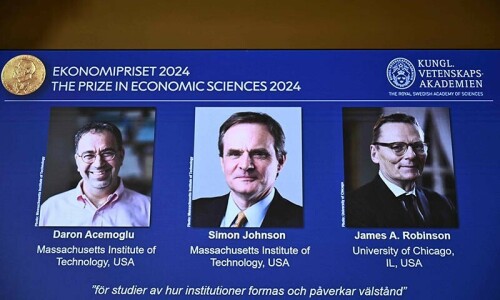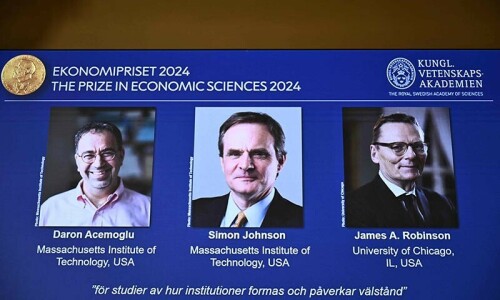This year, the Nobel committee awarded the prestigious honour to widely recognised US institutional economists, who enjoy considerable admiration within Pakistani academic circles.
Last week, the Royal Swedish Academy of Sciences announced the recipients of the 2024 Sveriges Riksbank Prize in Economic Sciences in memory of Alfred Nobel. Dr Daron Acemoglu, Dr Simon Johnson of Massachusetts Institute of Technology (MIT), along with James A Robinson of the University of Chicago, were recognised for their research on the formation of institutions and their impact on economic prosperity.
The laureates’ highly collaborative and influential work clearly demonstrates how institutions shape progress. They co-authored the 2023 book ‘Power and progress: Our 1,000 years struggle over technology and property’. A supporter remarked: “Their work helps explain why societies fail or thrive, making sense of our tumultuous world.”
Dr Durre Nayab, former Joint Director, Pakistan Institute of Development Economics and Director, Socioeconomic Insights and Analytics (SIA), Dr Ishrat Hussain, former Governor, State Bank and Sakib Sherani, founder, Macroeconomic Insights, viewed the recognition as a predictable outcome, given the stature of the economists involved. However, at least one senior Pakistani economist privately expressed reservations.
“It was widely expected that Dr Acemoglu and his co-authors would win this year’s award. While many of their ideas aren’t entirely new, they offered fresh perspectives by linking economic development to the quality of political and economic institutions in ways that were both accessible and deeply analytical. Their work demonstrates that inclusive institutions drive long-term growth, while extractive ones hinder it.
Nobel prize winning book on institutional economics receives compliments and critique as the larger academic world discusses its merit
“Critics argue their contributions are not groundbreaking, but academic work often builds on existing theories. Their research, rooted in ideas of economists like Douglass North and Joseph Schumpeter, advances institutional theory through empirical analysis and formal modelling, making their contribution significant,” Dr Nayab noted.
Dr Hussain viewed the recognition of institutional economists as a validation of his own academic work on Pakistan. “I am delighted that this path-breaking work highlights how institutions determine the destiny of national economies. My book, ‘Governing the ungovernable’, serves as an empirical proof of their thesis in the context of Pakistan,” he remarked.
Mr Sherani called this year’s Nobel prize timely, noting that the spread of authoritarianism and extractive institutions is casting a deepening shadow over many countries, including Pakistan. “It is vital to remind elites and those in power of the vital role that inclusive institutions and participatory democracy play in economic development,” he stated.
He also remarked on another strong contender for the Nobel, Susan Athey, who works at the intersection of AI and development, predicting she will likely be a future winner.
A senior economist expressed scepticism, suggesting there are doubts in the academic circles of the West regarding the originality, quality and supporting evidence of the work that earned them the prize.
Among international economists, there is always lively debate surrounding potential contenders before the Nobel Prize announcement, followed by extensive commentary on the selected laureates afterward. Social media has broadened these discussions, allowing differing opinions from experts and their forums to reach a wider audience, including the general public.
While celebratory notes and vlogs featuring insights from laureates, sometimes with their participation, are making rounds, critics of the Nobel committee’s choices are also voicing their opinions across various platforms. Detractors argue that laureates’ work is neither original nor entirely convincing.
A quick glance at these posts reveals that everyone is not convinced of the Nobel-level merit of their contributions. Some questioned the originality of ideas being explored, while others saw their selection as a reflection of the hierarchal academic establishment that influences the committee’s decision.
Some critics accuse laureates of taking a ‘reductionist’ approach. One blogger, in his commentary, noted their fixation on property rights as a defining factor for inclusive economic institutions. He found their interpretation insufficient as a guide to understanding democracy or development.
The three winning economists largely attribute a nation’s success or failure to internal factors, underplaying the impact of external influences, such as colonialism, imperialism and post-imperialist experiences.
Their simplistic explanation of uneven development within and across nations overlooks the complexities rooted in historical biases, cultural sensitivities, conflicts over shared resources, and the impact of these factors on the quality and timing of policy decisions.
The mere existence or enforcement of property rights doesn’t guarantee inclusivity. A property-owning democracy with broad ownership differs vastly from a plutocratic oligarchy. In many settler colonies, private land ownership was established by stripping native inhabitants of their rights, creating vast land holdings that entrenched long-lasting inequalities.
A critic noted that locking up of ideas through intellectual property rights, such as patents and copyrights, has faced rightful criticism. Even mainstream economists recognise the significant societal costs, as it restricts access to useful goods and services and stifles further innovation.
He noted that while it’s customary to credit award winners, the Nobel Prize in Economics creates a hierarchy of knowledge that promotes specific ways of thinking. This shapes which ideas are adopted both within the discipline and globally, a critical issue in a world seeking solutions.
Published in Dawn, The Business and Finance Weekly, October 21th, 2024














































Dear visitor, the comments section is undergoing an overhaul and will return soon.